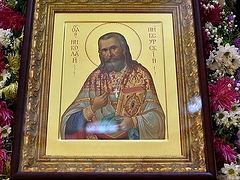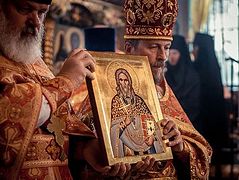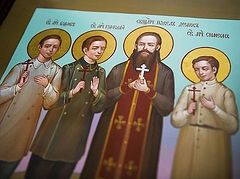Moscow, March 12, 2020
 The Martyrs of Raifa. Photo: raifa.ru Gathered under the chairmanship of His Holiness Patriarch Kirill in Moscow yesterday, the Holy Synod of the Russian Orthodox Church resolved to add 12 names to the Synaxis of the New Martyrs and Confessors, including a number of previously locally-venerated saints.
The Martyrs of Raifa. Photo: raifa.ru Gathered under the chairmanship of His Holiness Patriarch Kirill in Moscow yesterday, the Holy Synod of the Russian Orthodox Church resolved to add 12 names to the Synaxis of the New Martyrs and Confessors, including a number of previously locally-venerated saints.
The Synod heard the reports of His Grace Bishop Pankraty of Troitsk, the Chairman of the Synodal Commission for the Canonization of Saints, regarding the petition of His Eminence Metropolitan Mark of Vyatka and Sloboda to canonize Archpriest Nikolai Florov as a New Confessor, as well as several saints venerated in the Russian Church Abroad, reports Patriarchia.ru.
The Synod resolved to canonize Archpriest Nikolai, setting his commemoration as June 20/July 3, the day of his holy repose.
Following the 2008 Bishops’ Council of the Russian Orthodox Church, work began on resolving discrepancies between saints venerated in the Russian Orthodox Church Outside of Russia, who had been canonized during its time of separation from the Moscow Patriarchate, and those officially included on the Patriarchal calendar.
Thus, having studied the lives of a number of ascetics of piety from the period of persecution against the Russian Church in the 20th century, the Commission for the Canonization of Saints resolved to submit the names of several saints for inclusion in the Synaxis of the New Martyrs and Confessors of the Russian Church, which the Holy Synod approved:
-
Hieromartyr Maxim (Zhizhilenko), Bishop of Serpukhov (May 22/June 4);
-
Hieromartyr Sergei (Druzhinin), Bishop of Narva (September 4/17);
-
Hieromartyr Konstantin Zhdanov, priest (April 16/29);
-
Hieromartyr Nikolai Okolovich, priest (August 17/30);
-
Hieromartyr Nikolai Prozorov, priest (August 8/21);
-
Hieromartyr Sergei Tikhomirov, priest (August 8/21);
-
The monk-martyrs of Raifa: Hieromonks Anthony (Chikrov), Varlaam (Pokhilyuk), Job (Protopopov), Joseph (Gavrilov), Sergei (Guskov), and the novice Peter Tupitsin (January 14/27).
Hieromartyrs Konstantin Zhdanov and Nikolai Okolovich were also previously celebrated as locally-venerated saints in the Belarusian Exarchate, and the Martyrs of Raifa were locally venerated in the Kazan Diocese.
Should their remains be uncovered, they will be venerated as holy relics.
***
Archpriest Nikolai Florov was born on October 10, 1870 in the village of Pusheyskoe in the Vyatka Governorate in the family of a priest. He graduated from Vyatka Theological Seminary in 1894 and was appointed as a teacher at a parish school.
He was married in 1895 and subsequently ordained a deacon and then a priest, serving in various villages in Vyatka. He was especially active in educating the people.
During WW1, he was very active in praying for fallen soldiers and calling on others to help the injured. During this time he was also very active in writing; overall he published more than 120 sermons, speeches, and essays that attest to his special attention to the lives of ordinary people.
In July 1918, he was taken hostage together with other clergy, but he was released thanks to the intercession of a Red Army soldier who was the son of a priest.
In 1923, he was elected as the first dean of a new local deanery. In February 1924, he spoke against the renovationist movement at the Renovationist Diocesan Congress in Vyatka. During these years, he was elevated to the rank of archpriest.
In 1929, a fellow priest testified that conditions were so harsh that Fr. Nikolai went around in rags, worse even than what the beggars wore. At the same time, Fr. Nikolai wrote to his wife that he lived in peace and enjoyed reading St. Theophan the Recluse and writing spiritual music.
After the closure of his church, he was returned to his former village, where all his property, including his house, was expropriated.
He was soon invited to serve in a village where four priests and a deacon had been arrested two years prior. Realizing the danger, he went to serve anyways and was arrested in October 1932. A year earlier he had written on a notebook: “I will remain among Christians forever. October 28, 1931.”
From prison, he wrote: “I was accused of ‘registering a parish.’ I fulfilled my pastoral duty, opened a community, and celebrated the services. I believe I have imitated the apostolic zeal and am languishing in the name of Christ.”
Fr. Nikolai was sentenced to 3 years in exile, but being seriously ill, he was released from prison due to overcrowding in a barely alive state on July 3, 1933. He reposed in the Lord on the same day.



